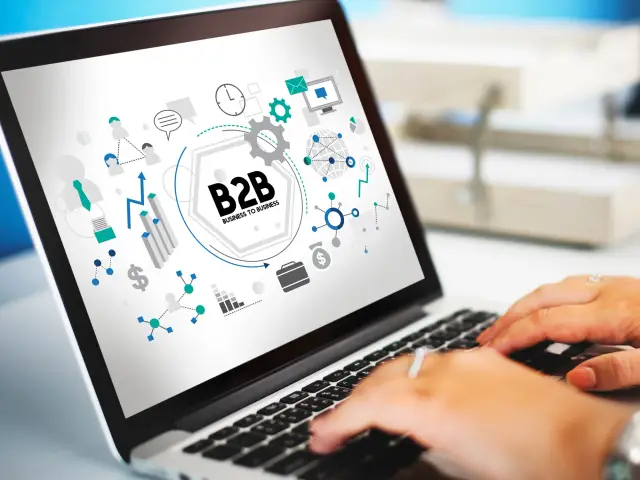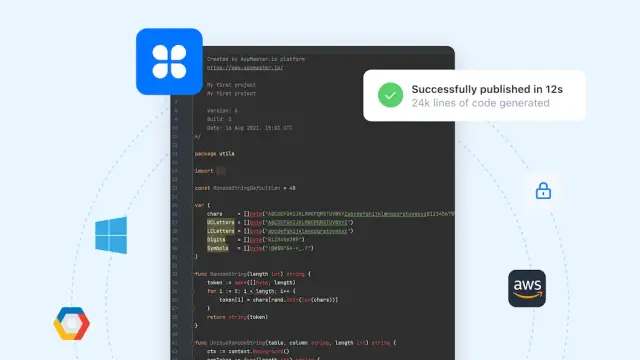What Is B2B SaaS?
In-depth guide to B2B SaaS: its benefits, working model, growth strategies, and future trends.

The Rise of B2B SaaS
B2B (Business-to-Business) SaaS (Software as a Service) has gained significant traction over the last decade as companies of all sizes look to streamline their business processes with more efficient and cost-effective solutions. As a cloud-based software model, it has changed the way businesses operate and interact with each other, enabling them to forgo the complexities and expenses associated with traditional on-premise software installations. The B2B SaaS model was born from needing more accessible, agile, and scalable software solutions.
As companies began to realize the potential of internet-based technologies, it became evident that the traditional on-premises model, which offered little flexibility and high costs, was no longer sustainable. This led to a shift towards cloud-based services, where software is hosted in the cloud and delivered to users over the internet. B2B SaaS providers offer a range of software solutions tailored to the specific needs of various industries and businesses. This has resulted in many companies adopting SaaS services across various functions, such as sales, CRM, marketing, finance, and HR.
How B2B SaaS Works
At its core, B2B SaaS delivers software applications over the internet through a cloud-based infrastructure. This enables businesses to access essential software tools without the need for expensive hardware, software licensing, or complex installations. The B2B SaaS provider hosts the software on their servers and handles all maintenance, updates, and security efforts. The customer then pays a subscription fee to access the software, typically based on usage or a per-user model. Upon subscribing to a B2B SaaS service, customers typically access the software via a web browser or dedicated app. This streamlines the process for employees to get started using the software, as minimal setup and technical expertise are required. Some key components of the B2B SaaS model include:
- Cloud-based infrastructure: Subscribers access the software through the provider's cloud infrastructure, which handles the technical aspects such as computing power, storage, and network connectivity.
- Subscription pricing: B2B SaaS providers charge a subscription fee, often monthly or annually, in contrast to the one-time license fees of traditional software.
- Automatic updates: As the software is hosted on the provider's servers, updates and new features can be rolled out automatically, ensuring that customers always have the latest version of the software.
- Scalability: SaaS solutions are designed to be easily scaled, allowing businesses to add or remove users, or access additional functionality and resources as needed.
Key Benefits of B2B SaaS for Businesses
The rapid growth of B2B SaaS adoption across businesses worldwide can be attributed to its numerous benefits:
- Lower costs: One of the most apparent advantages of B2B SaaS is cost reduction. By adopting a cloud-based solution, businesses can avoid significant upfront investments in software licensing and hardware and ongoing maintenance and upgrade expenses. Subscription-based pricing also allows for better budgeting and cost management over time.
- Easy access and deployment: As B2B SaaS applications are accessed through a web browser or app, deployment is straightforward and requires minimal technical expertise. This removes the need for a dedicated IT team to install, manage, and maintain the software, leading to further cost savings.
- Scalability and flexibility: SaaS solutions can easily be scaled to match a company's growth or changing needs. This ability to quickly adjust resources allows organizations to remain agile in the face of evolving business environments.
- Automatic updates: B2B SaaS providers are responsible for maintaining, updating, and securing the software, ensuring that users always have access to the latest functionality and that any security concerns are swiftly addressed.
- Enhanced collaboration: Cloud-based software enables users to collaborate more effectively, as data can be accessed and shared easily across multiple devices and locations.
- Improved data security: SaaS providers take care of security measures, such as firewalls, encryption, and data backups, which can be a great advantage to businesses that lack the resources or expertise to implement and maintain a secure IT infrastructure.
B2B SaaS Growth Strategies
In the highly competitive B2B SaaS market, having a comprehensive growth strategy is essential to succeed. The following are some essential elements of a powerful growth strategy that B2B SaaS companies should consider implementing.
Establish a Clear Value Proposition
An effective value proposition articulates the unique benefits that a SaaS solution offers to its customers. It sets a product apart from competitors and demonstrates the value that customers will derive from the software. Carefully crafting and presenting your value proposition to potential customers is crucial for attracting and converting leads.
Optimize Pricing Strategy
Finding the right pricing strategy is vital in the SaaS industry. Companies have various pricing models at their disposal, such as tiered pricing, freemium, usage-based, and flat-rate pricing. The key is to select a pricing model that aligns with your solution's value while remaining accessible to your target market. Periodically revisiting and adjusting your pricing strategy will ensure optimal profitability and customer satisfaction.
Attract and Retain Customers with Excellent Customer Support
Exceptional customer support is a core aspect of any successful SaaS business. Providing prompt, efficient, and empathetic support can significantly increase customer retention and word-of-mouth referrals. Moreover, maintain a dedicated customer success team to proactively engage with clients, ensuring they maximize the benefits of your software and remain loyal customers.

Build Strategic Partnerships
Forming strategic partnerships with complementary businesses can significantly boost your customer base, marketing efforts, and credibility. Collaborating with partners can result in joint development efforts, integrated apps, co-marketing campaigns, and other initiatives that offer mutual benefits.
Invest in Content and Inbound Marketing
Creating high-quality content effectively establishes yourself as a thought leader in your industry and generates inbound leads. Emphasize educational and informative content—such as blog posts, webinars, white papers, and case studies — that address your target audience's pain points and needs. The more relevant and impactful your content is, the more likely potential customers will trust your brand and expertise.
Utilize Marketing Automation
Marketing automation tools can significantly streamline and optimize your lead generation and nurturing efforts. Set up systems to track user behavior, segment audiences, and personalize messaging based on customer interactions. Automated email campaigns, retargeting ads, and lead scoring can significantly improve your conversion rates and decrease the time and effort spent on manual marketing tasks.
B2B SaaS Integration and Implementation
Successfully integrating and implementing SaaS solutions into a business can be complex. Here are some best practices to ensure a smooth and seamless transition.
- Prioritize data security and privacy: When integrating a new SaaS solution, data security and privacy are among the main concerns for businesses. Work closely with the software provider to ensure rigorous security protocols are in place and comply with all relevant industry standards and regulations.
- Establish integration objectives and success metrics: Before implementing a SaaS solution, it's crucial to identify specific objectives and success metrics related to the integration. By outlining measurable goals, such as productivity improvements or cost reductions, you can track progress and evaluate the effectiveness of the new software.
- Develop an integration roadmap: An integration roadmap helps to ensure a smooth transition, detailing each stage of the implementation process and assigning specific tasks and milestones to relevant team members. This plan should cover data migration, user training, system configuration, and any necessary customizations.
- Conduct thorough user training: Providing comprehensive training for users is vital for ensuring the successful adoption of new software. Both live and recorded training sessions may be beneficial, along with ongoing support and dedicated channels for users to ask questions and receive guidance. Monitoring user feedback can help to identify areas where further training may be required.
- Establish necessary system integrations: Seamless integration with existing systems is essential for achieving maximum efficiency from a B2B SaaS solution. Determine how the new software will interact with current systems, such as CRMs or data warehouses, and evaluate any required API integrations or custom connectors to achieve a coherent technology stack.
The Future of B2B SaaS
The B2B SaaS industry continues to evolve, driven by a combination of technological advancements, changing business needs, and emerging trends. Here are several developments that will shape the future of the sector.
Artificial Intelligence (AI) and Machine Learning
AI and machine learning transform how businesses leverage data and make strategic decisions. In the B2B SaaS space, companies will continue developing AI solutions to improve decision-making, streamline processes, and boost productivity. As AI technologies mature, B2B SaaS providers who harness these capabilities effectively will have significant competitive advantages.
Internet of Things (IoT) Integration
The Internet of Things (IoT) enables unprecedented levels of connectivity and data sharing among devices. B2B SaaS providers that can effectively incorporate IoT capabilities into their solutions will offer significant value to customers, enabling better management, tracking, and analysis of connected assets.
Personalization and Customization
As businesses increasingly rely on software to manage and optimize their operations, they demand more sophisticated levels of customization within their SaaS solutions. B2B SaaS providers offering personalization options to suit the unique requirements of individual businesses will have a competitive edge.
Vertical SaaS
Vertical SaaS solutions cater specifically to the needs of particular industries, offering tailored functionality and deep industry knowledge. The demand for vertical SaaS solutions will grow as businesses seek software that aligns closely with their unique operational requirements, regulatory guidelines, and industry-specific data standards.
Decentralization and Blockchain Technology
Decentralized technology and blockchain can potentially revolutionize how businesses interact, transact, and secure their data. B2B SaaS providers that integrate blockchain-based solutions and decentralized networks into their products can offer their customers increased transparency, efficiency, and security.
One of the leading platforms that support the B2B SaaS industry is AppMaster.io. A powerful no-code tool, AppMaster.io enables the development of backend, web, and mobile applications using visual design tools and blueprints. With its innovative features, scalability, and state-of-the-art integrations, the AppMaster.io platform can help B2B SaaS providers build and deploy applications faster and cost-effectively, ensuring they stay competitive in this rapidly evolving industry.
AppMaster.io and B2B SaaS: A Powerful Synergy
As B2B SaaS continues dominating the software market, the AppMaster platform is critical in helping businesses adapt to this paradigm shift. AppMaster.io is a comprehensive no-code platform for building backend, web, and mobile applications. Its innovative approach to application development allows businesses to quickly create and deploy scalable software solutions while minimizing technical debt and reducing development time.

Here's how AppMaster.io plays a significant role in the B2B SaaS world:
- Accelerating B2B SaaS development: With its intuitive visual interface, AppMaster.io makes it easy for both technical and non-technical users to create complex applications without writing code. This drastically reduces the time it takes to develop and deploy a B2B SaaS solution, enabling businesses to innovate and adapt faster. AppMaster.io's platform has received numerous accolades, including being named a G2 Momentum Leader in No-Code Development Platforms multiple times between 2022 and 2023.
- Reducing cost barriers: The affordability of AppMaster.io's various subscription plans allows businesses of all sizes to access powerful no-code development tools. Its tiered pricing model caters to startups, small businesses, and large enterprises, allowing organizations to build custom B2B SaaS solutions based on their unique needs and budget constraints.
- Elastic scalability: B2B SaaS companies often need to support large numbers of users and handle high volumes of data. Thanks to the use of compiled stateless backend applications generated with Go, AppMaster.io-built applications deliver exceptional scalability for enterprise and high-load use cases.
- Integration-ready solutions: To meet the diverse needs of businesses, AppMaster.io applications can seamlessly integrate with any PostgreSQL-compatible database as their primary database. Furthermore, AppMaster.io offers several APIs, allowing businesses to connect their B2B SaaS applications easily with other tools and systems.
- Eliminating technical debt: Unlike traditional software development, where adjusting requirements can lead to technical debt and complications, AppMaster.io regenerates applications from scratch whenever changes are made. This ensures that minimal technical debt accumulates and development efforts remain efficient.
- Deploy on-premises or in the cloud: Unlike other platforms, AppMaster.io offers the choice to deploy applications on-premises or in the cloud, giving businesses full control and flexibility over their B2B SaaS solutions. As B2B SaaS continues to grow, businesses must find innovative ways to stay competitive and adapt to new market needs.
AppMaster.io empowers businesses to leverage B2B SaaS and propel their digital transformation journey through its powerful no-code platform and features. By adopting AppMaster.io, organizations can streamline their application development processes, gain a competitive edge, and thrive in the world of B2B SaaS.
FAQ
B2B SaaS stands for "Business-to-Business Software as a Service." It refers to software applications delivered over the internet that cater specifically to the needs of businesses, providing them with scalable solutions for various tasks and operations.
B2B SaaS targets businesses and organizations, offering solutions that address complex business processes, data management, collaboration, and more. In contrast, B2C SaaS targets individual consumers with applications like entertainment, fitness, or personal productivity tools.
B2B SaaS solutions offer benefits like cost-effectiveness through subscription-based pricing, scalability to accommodate growing business needs, accessibility from any location, regular updates, and the ability to focus on core business activities.
B2B SaaS streamlines business operations by providing tools for project management, customer relationship management (CRM), human resources management, financial planning, analytics, and more.
Yes, many B2B SaaS solutions offer customization options to align with a business's unique requirements. Some platforms provide integration capabilities to connect with existing systems and workflows.
B2B SaaS solutions are used across a wide range of industries, including finance, healthcare, manufacturing, e-commerce, marketing, logistics, and more. They cater to diverse business needs and processes.
Yes, many B2B SaaS solutions offer integration capabilities through APIs, allowing businesses to connect them with their existing software systems, databases, and workflows.





